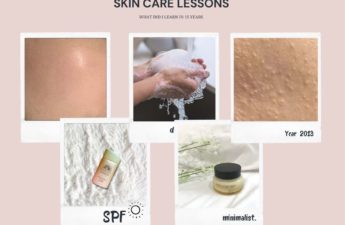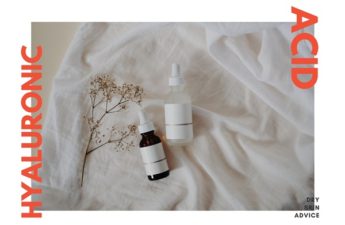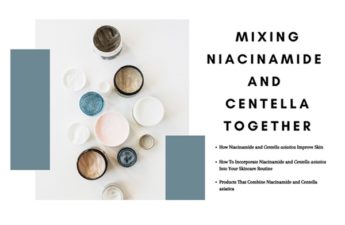Back in the 00s, facial oils had a bad reputation. All we want is oil-free or gel-like products that will not leave our skin look greasy back then. However, facial oils quickly gained their popularity in the past few years because of the glass skin or glowing skin trends. Picking a facial oil can be overwhelmed. It seems like every facial oil brings multiple benefits to your skin. But every skin type needs are different. We did some researches and in this article, we are going to discuss facial oils and hopefully helping you make the right choice for your skin!
How to Use Facial Oil
There are several ways to use a facial oil. But most beauty oils are commonly used as a moisturizer. Keep in mind that you can’t hydrate and moisturize your skin with just facial oil. However, you can seal all the hydration in your skin with facial oil. Facial oil acts as an emollient for your skin that will prevent moisture loss and a protective barrier for your skin. With that being said, hydrate your skin with humectants (glycerin, hyaluronic acid) and apply your oil on top of your skin to keep all the moisture in your skin.
Related Article: 11 Ways to Use A Beauty Oil
Determine Your Skin Types
- normal
- dry skin
- oily skin
- acne-prone skin
- sensitive skin
- mature skin
Normal Skin
Normal skin type means you have a well-balanced skin type. Your skin is not overly oily nor overly dry. Generally, you do not have much skin problems like large pores and acne. However, your skin might feel dry from time to time as you age.
Dry Skin
Dry skin type is those with skin that produces less sebum compared to other skin types. You often found your skin feeling tight or itchiness especially after you wash your face with an alkaline-based face wash. Your skin texture can feel rough or sometimes flaky.
Oily Skin
Oily skin type is opposite with dry skin type, it is those with skin that produces more sebum compared to other skin types. People have oily skin tend to have larger pores and shiny complexion. In addition, oily skin type also commonly have other skin problems such as blackheads, whiteheads, and pimples.
Acne-prone Skin
Acne-prone skin is a skin type that prone to breakouts and clogged pores. Just like any other skin type, acne-prone skin type is mostly genetics. Your skin is easily triggered by skincare products, hormones, or daily habits that will result in breakouts on your skin. Be really selective when it comes to picking your skincare products to avoid causing skin problems.
Sensitive Skin
Sensitive skin people suffered from multiple symptoms like redness, itchiness, or rashes. They tend to have thinner skin and blood vessels look visible on the skin surface. This particular skin type is easily irritated and inflamed. Some might react to fragrances, paraben or sulphate.
Mature Skin
We all will get old one day and as we age, so does our skin. Our skin is prone to dryness, wrinkles, and large pores when we get older. The process of collagen and skin cell production slows down and our skin will slowly lose its elasticity and firmness. Using anti-aging skincare that will stimulate collagen production and fight free radical production will help improve mature skin.
Related Article: Start Doing These 30 Things Today to Improve Dry Skin
Related Article: 11 Ways to Use Argan Oil
Related Article: How to Prevent Your Skin Dry Out from Hot Shower
Facial Oils
- argan oil
- grapeseed oil
- jojoba oil
- marula oil
- olive oil
- coconut oil
- avocado oil
- squalane oil
- sweet almond oil
- rosehip oil
- sea buckthorn oil
- camellia oil
- macadamia oil
- chamomile oil
- hemp oil
- sunflower oil
- tamadu oil
- pomegranate seed oil
You can download this chart in vertical form from our Pinterest.
Argan Oil
Argan oil is rich in nutrients, with all three essential fatty acids (omega 3, 6 & 9) that will nourish your skin and keep skin firm. Perhaps this is where the facial oil trend started. Argan oil is extracted from argan tree in Morocco and it has been used by Moroccan women for centuries keeping their skin, hair and nails glowing and healthy. Argan oil is naturally rich in texture and vitamin E which makes it perfect for dry and mature skin types.
Grapeseed Oil
Grapeseed oil is extracted from grape seeds that can help improve various skin conditions. High in linoleic acid, grapeseed oil is a great option for people who have oily or acne-prone skin types. It has a lightweight texture that will penetrate into your skin deeply and quickly without clogging your pores. Besides, linoleic acid helps control sebum and balance skin out. Thus, it will aid acne and breakout problems.
Jojoba Oil
With its exceptional healing ability and non-irritating, jojoba oil is a perfect match for people suffered from dry skin and sensitive skin. Jojoba oil speeds up the skin’s healing process by binding skin cells together. It relieves dryness, itchiness and even eczema. Furthermore, it is easily absorbed into the skin without making your skin feel heavy and greasy.
Marula Oil
Different parts of marula tree are commonly used in traditional medicine throughout Africa. Even though marula oil is a newcomer in the beauty industry, but do not underestimate its power. It contains rich amount of amino acids, fatty acids and antioxidant. As a result, your face feels intensively moisturized with just a few drops of marula oil. However, marula oil has a high percentage (up to 78%) of oleic acid (source). Therefore, avoid this oil if your skin is prone to acne and breakouts.
Olive Oil
Olive oil has been used on skin and hair since ancient times. It is a strong antioxidant and ultra-moisturizing that will fight free-radical damage and combat dry skin. Olive oil possess a similar composition with marula oil which contains a higher percentage of oleic acid. Although it is high in squalene and deeply moisturizing, olive oil has a potential of clogging pores. Always remember less is more when it comes to using olive oil on your face.
Coconut Oil
Coconut oil is such a versatile oil. It is typically used in the kitchen or hair care. Nowadays, you can actually spot this ingredient in skincare products. Coconut oil could bring some benefits to the skin such as antibacterial and antioxidant but it is highly comedogenic which makes it not ideal to use it on skin. Besides, it has a thick texture that makes it harder to penetrate and absorbed by the skin.
Avocado Oil
Rich in vitamins and fatty acids makes avocado oil an excellent moisturizer for dry skin and mature skin. Fatty acids and nutrients in the avocado oil help to comfort dry and flaky skin. Apart from that, vitamins in avocado oil also slow down aging skin by increasing collagen production in the skin.
Squalane Oil
Steadily gaining its crown in the beauty world, squalane oil definitely is a game-changer for people with oily and acne-prone skin. The texture is light as a feather that will moisturize your skin and make your skin softer. Most squalane oils are non-comedogenic so it’s very unlikely that it will clog your pores. It keeps your skin moisturized without feeling greasy.
Sweet Almond Oil
Derived from almond, almond oil replenishes and provides multiple vitamins to your skin at the same time. Vitamin E in almond oil serves as a great source of vitamin E. It brightens and even out dull skin tone. Moreover, it is hypoallergenic and anti-inflammatory helps to boost the immunity of the skin and reduce skin irritation. With that being said, sweet almond oils are most beneficial to people with dry skin or sensitive skin.
Rosehip Oil
Rosehip oil is a potent antioxidant that brings so many benefits to your skin. Full of vitamin C and vitamin A, it stimulates collagen production and slows down the aging process. Besides, it regulates sebum production in your skin. People who have acne-prone skin generally have a higher percentage of oleic acid than linoleic acid in their skin. (source) In this case, rosehip oil contains a higher percentage of linoleic acid which will balance out the skin and improve breakouts and acne problems.
Sea Buckthorn Oil
Orange in color, extracted from the sea buckthorn plant, this oil is a natural remedy for the Chinese. It improves skin elasticity and protects skin from external aggressors such as sun damage. Sea buckthorn oil contains a high amount of fatty acids which will help your skin to retain moisture and make your skin glow. On a side note, the color of the oil will stay on your face until you wash it off. For that reason, make sure you use a small amount of the oil or dilute it with your moisturizer.
Camellia Oil
Camellia oil is a rich source of fatty acids and vitamins which makes camellia oil extremely nourishing for mature skin type. It has a lightweight texture that you can easily spread on your face evenly. It forms a protective layer that will protect your upper skin layer and seal all the moisture in your skin. Be mindful that this oil contains a higher percentage of oleic acid that will not be suitable for oily or acne-prone skin. Apart from that, camellia oil also repairs your hair and lashes.
Macadamia Oil
Often used as cooking oil, macadamia oil is actually good for your skin and hair. It hydrates dry skin like a dream with just a small amount. Furthermore, it doesn’t feel greasy and will lay well under your makeup. This is the solution for you if you constantly find your foundation becomes cakey throughout the day. Because of its high amount of oleic acid, this is not a great choice for people with oily or acne-prone skin. It might end up clogging your pores and increases sebum production.
Chamomile Oil
Chamomile has been well known as a wound-healing plant centuries ago. So you can expect its strong healing and soothing ability help to soothe redness on sensitive skin. Sensitive skin is often associated with eczema, rosacea, and rashes that will cause the skin to feel flushed and red. Chamomile oil can relieve the symptoms and soothe the skin.
Hemp Oil
A newcomer in the beauty oil industry, however, hemp oil has quickly become a cult favorite. Its featherweight texture makes it suitable for most skin types including oily and acne-prone skin. It regulates sebum production and helps to balance out oily skin. As a result, your skin will not overproduce oil and improve your skin texture.
Sunflower Seed Oil
Sunflower seed oil is loaded with vitamin E and linoleic acid that easily absorbed into the skin. It is suitable for most skin types, but oily skin and sensitive skin types get the most out of it. This is because sunflower seed oil is non-comedogenic that will not clog your pores and cause skin breakouts. Besides that, it soothes inflammation and redness by creating a protecting barrier that will protect skin and help retain skin’s moisture.
Tamanu Oil
Have dry and flaky skin problem? Try to incorporate tamanu oil into your skincare routine. This ultra-moisturizing oil extracted from tamanu nut tree and has been used as a medicine in many countries such as Africa and China. It is loaded with antioxidants and fatty acids that are greatly beneficial for dry and mature skin types. Antioxidants in tamanu oil help slow down the aging process by slowing down free-radical production. In addition, tamanu oil stimulates collagen productions and speeds up skin cell regeneration.
Pomegranate Seed Oil
Pomegranate seed oil rejuvenates and repairs aging skin. Problems like wrinkles and spots are commonly found on mature skin. Punicic acid found in pomegranate seed oil fights free radicals and reverse aging damage. Moreover, it contains a good balance of oleic acid and linoleic acid which makes it suitable for most skin types including oily skin and acne-prone skin. Your skin texture is improved, looking youthful and firm.






